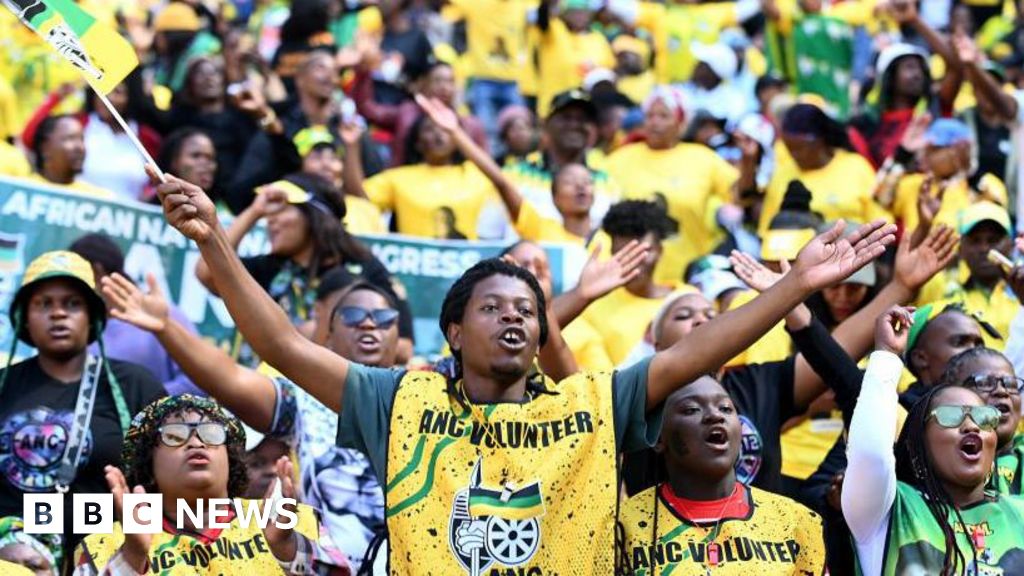Image source, Getty Images
- Author, Barbara Plett Usher
- Role, BBC Africa Correspondent
- Reporting from Cape Town
-
As South Africa’s parliament meets for the first time since the governing African National Congress (ANC) lost its majority in last month’s elections, negotiations are still continuing over the formation of a new government.
The ANC says it has made a “breakthrough” on forming a government of national unity but it was too early to give details.
Former leader of the opposition Democratic Alliance (DA) Hellen Zille, who has been representing the party in talks, told the BBC that if a deal wasn’t reached, it wouldn’t support President Cyril Ramaphosa’s re-election.
One of parliament’s first duties on Friday is expected to be a secret vote on whether Mr Ramaphosa remains president.
However Ms Zille said the two sides were very close to a deal.
“This morning at two am we thought we had a finalized agreement, but this morning a few issues have arisen and they’re just trying to sort them out.”
The ANC lost its parliamentary majority for the first time in 30 years in the 29 May election, getting 40% of the vote.
This means it required the backing of other parties for Mr Ramaphosa to remain in power.
“We are talking to political parties as we speak right now,” ANC secretary general Fikile Mbalula told reporters after a meeting of the party’s top officials on Thursday evening, adding he could not give further details.
He did say it would be a move to the political centre, because breakaway ANC parties on the left have said they will not join a coalition.
He said parties including the pro-business DA had agreed on forming a government of national unity.
But the ANC and DA have not agreed on how exactly they will cooperate, Mr Mbalula added.
“If the DA were to get some of these things that it wants, it means the ANC will be dead,” he said.
The DA came second in the election with 22% of the vote.
DA spokesman Mr Malatsi told the BBC’s Newsday programme: “There were still very key outstanding matters that ought to have been finalised by the end of the day yesterday [Thursday]. That wasn’t the case due to the nature of the negotiations we’re in.”
The Zulu nationalist Inkatha Freedom Party (IFP) has already said it will take part in a government of national unity. It came fifth with 4% of the vote.
President Ramaphosa has previously accused the DA – which draws its support mainly from racial minorities – of being “treasonous” and “reactionary”.
Ms Zille said the DA and ANC had been “strong opponents for decades” and trying to build trust in 10 days has been a “challenge”.
Any deal with the DA would be unpopular among many ANC activists.
The party is an advocate of free market economics, which is at odds with the ANC’s left-wing traditions, and is seen by its critics as representing the interests of the white minority.
The ANC has billed the coalition as a Government of National Unity (GNU), but it failed to get the third- and fourth-biggest parties – former President Jacob Zuma’s uMkhonto weSizwe (MK) party and Julius Malema’s Economic Freedom Fighters (EFF) – to join it.
MK had set the resignation of Mr Ramaphosa as one of the conditions for entering into a coalition, but the ANC rejected the demand.
Mr Malema on Thursday evening said the EFF had refused to join a government which included the DA, saying it was part of the “imperialist agenda”.
Both MK and EFF also demanded changes to the constitution to allow for nationalisation, including of white owned-land and banks.
Mr Ramaphosa opposed this, saying the ANC would not form a coalition with parties that wanted to change the constitution.
#South #Africa #government #national #unity #talks #continue #ANC,
#South #Africa #government #national #unity #talks #continue #ANC
